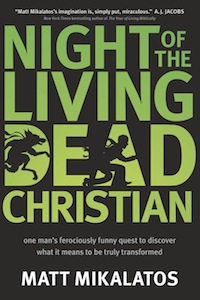 Bruce Morton graciously sent me a copy of his book Deceiving Winds: Deceiving Winds – Christians Navigating the Storm of Mysticism, Leadership Struggles & Sensational Worship. He did not request a review; he merely sent me the book to share his views with me.
Bruce Morton graciously sent me a copy of his book Deceiving Winds: Deceiving Winds – Christians Navigating the Storm of Mysticism, Leadership Struggles & Sensational Worship. He did not request a review; he merely sent me the book to share his views with me.
Morton’s book sets out to study the influence of the religion’s of Ephesus on the church in that city. In particular, he studies the worship of Artemis and Bacchus as reflected in the letters of Ephesians, 1 Timothy and 2 Timothy. The book is an excellent resource for anyone wanting to gain insight into this facet of these letters; the endnotes and bibliography make up almost one third of the book.
Where Morton loses his way is when he turns to exegesis. He has taken some issues that he feels deeply about and made them the primary concerns of these letters. Primarily, he is discussing feminism and instrumental music; the backdrop of these pagan religions allow him to work these topics into passages throughout these epistles.
In an analysis of some statements from Seeking a Lasting City (Love, Foster, Harris), Morton states, “The apostle is not talking about the whole of apostolic teaching and Christian doctrine. Instead, he is talking about specific Christian doctrine and the false teaching his readers have heard.” (p. 155) This critique of others’ work aptly fits Morton’s study as well. He takes teachings addressed to a specific situation in Ephesus and tries to apply them to all Christians throughout all times. By making such a strong case about the background of these letters, he has weakened the modern application of the passages he’s studying. For example, if the reference to not being drunk in Ephesians 5 only refers to the worship of Bacchus, then it says nothing to those who would drink outside of a religious context or even outside of the context of Bacchus worship.
Basically, what Morton tries to do is relate all of the emerging church movement, as well as the teachings of progressive members of churches of Christ (which are two very different things!), to these ancient religions. This doesn’t work, because shared practices do not mean that two religions are the same. That is, the fact that the Ephesian religions used instruments and modern churches use instruments does not make their worship the same. If that were true, the modern church would have to cease many of its practices; a good study of New Testament backgrounds shows that much of what Christianity does is not unique to Christianity.
Morton also errs in making general statements which reflect his feelings, but have no objective support. For example, when discussing those who have decided that instrumental music should be excluded from Christian worship, Morton declares, “The conclusion represents a commitment to the divine character and authority of apostolic teaching and the New Testament as a whole.” (p. 92) The implication, of course, is that those who disagree share no such commitment.
Another troubling practice in this book was the use of quotations to support things that the original writer did not have in mind. For example, in the section on singing, Morton quotes numerous individuals who praise the value of singing. How many of those people would have limited their comments to a cappella singing? Few, if any. But Morton presents them as if they strengthened his case against the use of instruments in the modern church.
As I said, as a study of the background of Ephesians, 1 Timothy and 2 Timothy, this book is an excellent resource. (I’m puzzled as to why so little time was spent in addressing the letters of Revelation 2-3, which went to people facing the same religious influences in the same geographic area). As to application, rather than an exegesis of passages within those books, Morton has basically provided us with a series of rants* about the things he doesn’t like in the modern church.
*[Edit: January 12, 2012 — It’s been called to my attention that the word “rant” is misused here. Rant implies a degree of emotion and vehemence which is not present in Morton’s writings. I often misuse the word in my own speech and writing to refer to something that is written with the sole intent of criticizing. The dictionary definition of the word is different from my usage.
Note: I received this book for free, with no obligation to write a positive review. The links in this post are for an associate account with Amazon.
Like this:
Like Loading...
 Instead of doing a Friday book review, as I have at times in the past, this Friday I have a book announcement. Steve Ridgell and I have written a third book: More Hope For Life. This is a follow-up to our 2011 Herald of Truth publication, Hope For Life.
Instead of doing a Friday book review, as I have at times in the past, this Friday I have a book announcement. Steve Ridgell and I have written a third book: More Hope For Life. This is a follow-up to our 2011 Herald of Truth publication, Hope For Life.



 . They sent me a free review copy, as well as the chance to give away a copy to one of my readers. Travis was the first to comment, and the random number generator at www.random.org came up with “1” as the winning number.
. They sent me a free review copy, as well as the chance to give away a copy to one of my readers. Travis was the first to comment, and the random number generator at www.random.org came up with “1” as the winning number.